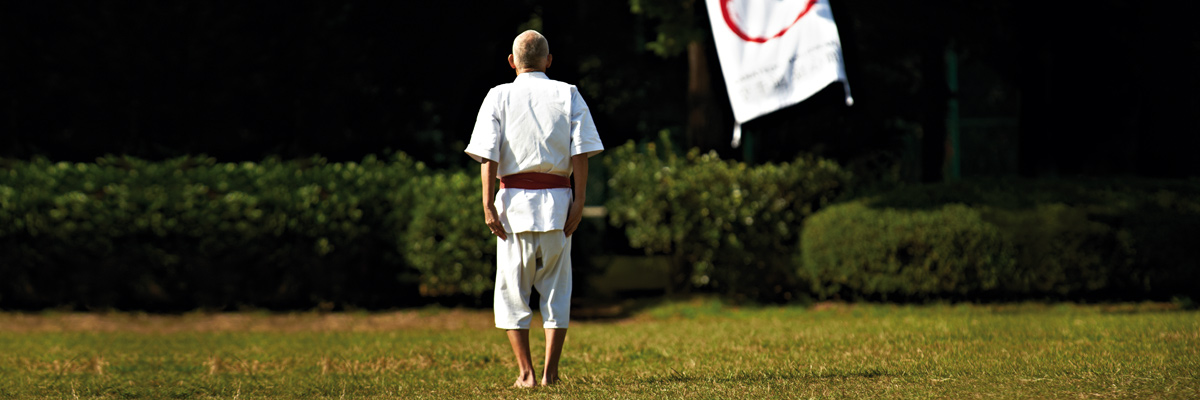History and Tradition of Karatedo Doshinkan
Foundation and Leadership of Karatedo Doshinkan
Hanshi Isao Ichikawa (1935 – 1996) founded Karatedo Doshinkan and the honbu dojo in Vienna, Austria. Doshinkan means »school« in which »the way of the heart« is taught and practiced. Hanshi I. Ichikawa came to Vienna in 1967 after the death of his teacher Kanken Toyama, who bestowed upon him the rank of 10 th dan (the highest grade) and the title Hanshi (the highest title).
As the founder of the new school Doshinkan, Hanshi I. Ichikawa was nevertheless the heir of Kanken Toyama because Toyama requested that the name Shudokan never be used after his death.
Daishihan Kanken Toyama (1888 – 1966) was one of the first who brought karatedo from Okinawa to Japan. In 1930, he founded a dojo in Tokyo, naming it Shudokan. With this »school of the study of the way« Kanken Toyama however did not want to found a new »style« (ryu-ha).
Hanshi I. Ichikawa, too, did not want to found a »style« by means of specialization and differentiation. He wanted to create a new system in which karatedo is practiced in its entirety of a martial art and be passed down with purpose. But, according to the will of Hanshi I. Ichikawa, Karatedo Doshinkan was not to end after his death, instead it should grow and develop continuously.
Hanshi I. Ichikawa was one of the earliest teachers who introduced an authentic form of karatedo outside Japan, spreading it to Europe and Mexico. Karatedo is an authentic form – a »way« -, insofar as its purpose is to cultivate man and not to encourage sportive competition.
Hanshi I. Ichikawa had an exceptional level of perception and memory, bringing a rich treasure of kata and technique into his new school. He knew the name of every member and his or her level of performance.
Hanshi Nobuo Ichikawa (1941-2019) has lead Karatedo Doshinkan since 1996. He was designated to be Hanshi I. Ichikawa´s successor shortly before the former’s death and was bestowed the 10th dan and the title of Hanshi. Nobuo Ichikawa was always at the side of Isao Ichikawa throughout the founding and spreading of this school worldwide. He passed on the tradition of Karatedo Doshinkan in its deepest knowledge and sense.
Hanshi 10 Dan Nobuo Ichikawa passed away March 6th, 2019. Some time before his death he chose Shihan Masako Fujimoto-Stock as his successor as Hanshi 10 Dan. Recieving the red belt in a ceremony on March 31st 2019 she became the new head of Karatedo Doshinkan.
The System of Karatedo Doshinkan from a Historical Perspective
The master trains with all pupils including beginners, and as the leader of the training, he always performs all aspects of the training, using himself as a model. In this way, Karatedo Doshinkan distinguishes itself from the older Japanese system of teaching. As a result, all members can learn directly from Hanshi. When Hanshi executes all movements himself, including even the simplest techniques, it emphasizes the importance of basic movements and their continuous development. The importance of what seems to be the simplest movement does not diminish, when breadth and complexity of knowledge is increasing.
The transfer of Karatedo Doshinkan is always based on the relationship between master and student. Exclusively through this method, the school has spread over countries and continents. All members are constantly in contact with Hanshi. Each single dojo has leaders who shape the training in the absence of Hanshi.
The ability to promote is conducted only by Hanshi.
When a martial art is performed in its original sense, of a »way« (»do«), everyone is able to develop individually without having to measure herself or himself with each other. Judging by comparison is possible only within the development of one personality: between the present self and his former self.
Karatedo Doshinkan continues to develop openly. It remains a »way« for each person and for the entire system. The shape of the training and the goal of every member is not predetermined by modes of examination or by rules of competition (competition does not exist in Karatedo Doshinkan). Whereas, in this system,
